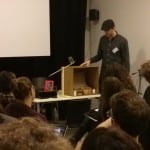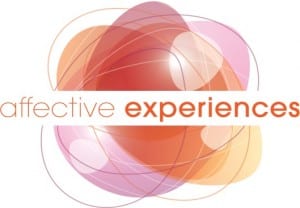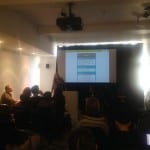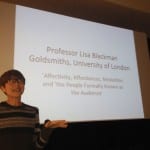Affect, Audience Experience and the Digital Humanities
By Vasileios Routsis, on 12 December 2013
Authors: Christina Kamposiori & Vasileios Routsis
Monday 9th December 2013 saw our conference ‘Affective Experiences: media art, design & research’ which took place at the Parasol Unit: foundation for contemporary art. This conference was a great opportunity to close the conversations we started on February on the context of the AHRC funded project ‘New Media, Audiences and Affective Experiences’.
The project aimed to establish a platform for creative dialogue and collaboration for doctoral students from City University London, Kings College London, Middlesex University, New London Graduate School (NLGS) and University College London in the academic fields of Creative Industries and Practice, Art and Design and Digital Humanities. In this context, we were honoured to represent UCLDH as a distinguished partner of this collaborative effort. During the lifetime of the project, we organised three seminars that took place at the City University London, discussing research methods in the direction of understanding audience engagement and cultural experience through digital technologies.
 Through our one day conference we aimed to bring together artists, PhD students and established academics and researchers from a variety of disciplines, including art and design, cultural and creative industries, media studies, museum studies and the digital humanities. Participants presented their research and discussed new developments on understanding and measuring affect and audience experience in the digital age.
Through our one day conference we aimed to bring together artists, PhD students and established academics and researchers from a variety of disciplines, including art and design, cultural and creative industries, media studies, museum studies and the digital humanities. Participants presented their research and discussed new developments on understanding and measuring affect and audience experience in the digital age.
In particular, our keynote and panel speakers addressed issues from a wide and diverse spectrum of perspectives, ranging from the theoretical aspects of affect and perception in relation to audience experience to the more practice-based ones. For example, we had the opportunity to hear from artists and museum professionals on the innovative ways they used to engage with audiences, such as interactive installations, experiments and digital applications. In addition, we looked on methodologies and applications for furthering audience/user related-research; that is also when Professor Melissa Terras presented Textal.
Concluding, this conference was a stimulating experience and we hope that the end of this project will be a start for new collaborations and discussions on the issues of affect, audience/user experience and digital technologies in the Arts & Humanities and Culture.
Acknowledgements
Special thanks to Irida Ntalla, PhD Candidate at City University London (project’s principal co-ordinator), Marianne Markowski, PhD Candidate at Middlesex University (programme committee member), Anastasia-Yvoni Spiliopoulou, UCL Digital Humanities MA Graduate (conference volunteer) and Kathianne Hingwan (conference volunteer) for the great collaboration!
 Close
Close






 The
The